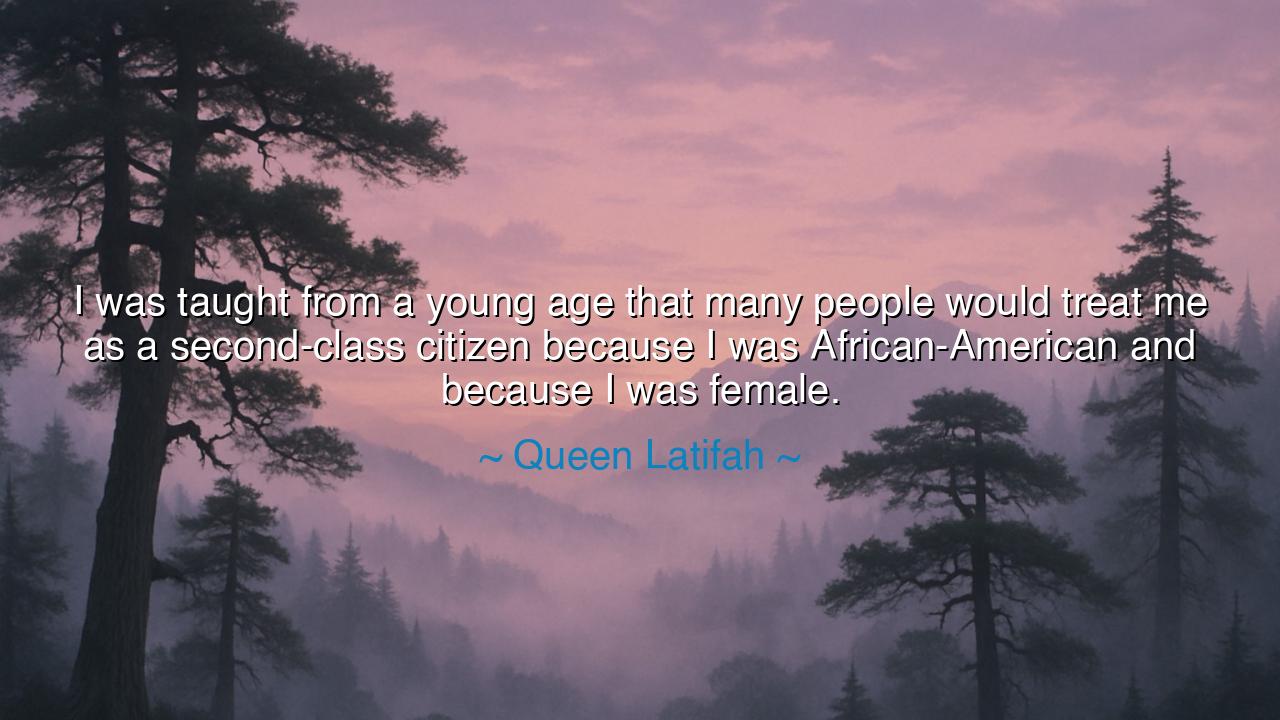
I was taught from a young age that many people would treat me as
I was taught from a young age that many people would treat me as a second-class citizen because I was African-American and because I was female.






"I was taught from a young age that many people would treat me as a second-class citizen because I was African-American and because I was female." — thus spoke Queen Latifah, a woman of strength and grace, whose words carry the weight of centuries and the defiance of the human spirit. Her reflection is not one of bitterness, but of truth — a truth passed down like a hard inheritance through generations who knew that to rise, one must first understand the gravity of the chains that seek to bind. In her voice echoes the struggle of those who were told they were less, yet dared to become more.
In the ancient manner of wisdom, we might say: before a soul can conquer the world, it must first conquer the world’s opinion of it. Queen Latifah’s words reveal a lesson learned early — that the path of the African-American woman is not an even road, but one marked with stones of prejudice and shadows of exclusion. She was taught not so that she would despair, but so that she would prepare — to meet injustice not with submission, but with awareness and strength. Her mother’s lesson was armor for the soul, a warning that the world may not honor her light, yet her light must burn nonetheless.
From such awareness is born a power greater than any weapon: the knowledge of self-worth. For the one who knows she will be underestimated can choose to rise above it, and her rise becomes a quiet revolution. Latifah, whose very name means “delicate and kind,” forged a throne in the harshest arenas — music, film, and leadership — proving that dignity and defiance can dwell in the same heart. Her success was not the denial of her struggle but the fruit of it; she turned society’s condescension into the rhythm of her empowerment.
History, too, bears the names of women who stood against the weight of such injustice. Consider Sojourner Truth, who once stood before a crowd and asked, “Ain’t I a woman?” In that question was thunder. In it, the defiance of centuries of women who were denied their place both for their color and their gender. Like Queen Latifah, she saw that the world’s denial could not define her worth. Though she was born into bondage, she spoke with the voice of freedom — for she understood that freedom begins not with law, but with belief.
The lesson of Latifah’s quote is therefore not merely personal — it is a message for all who walk beneath the shadow of prejudice. To be told that one will be treated as less is not to accept inferiority; it is to be warned of the world’s blindness. The wise do not internalize such injustice — they prepare to transform it. When others see weakness, they cultivate strength. When others close doors, they build their own. Awareness of bias does not enslave the spirit; it arms it.
But this awareness must not harden into hatred. To endure and to excel, one must master the delicate art of resistance — to stand tall without becoming bitter, to fight without losing grace. For the world does not need more cruelty; it needs more courage. The heart that forgives yet refuses to bow is the heart that changes history. Queen Latifah, rising from the lessons of hardship, teaches us that one can acknowledge the weight of injustice and still walk upright beneath it.
The teaching is clear: know the world’s cruelty, but never let it define your worth. If you are told you are lesser, let that lie be the forge of your greatness. If you are silenced, let your silence become song. Educate your spirit as her mother did — not to accept inequality, but to face it without fear. For every person who has been called “second-class” must remember that no one can make you lesser unless you agree to forget your own light.
And so, my child, remember this: the world may not always greet you with fairness, but you must greet it with strength. You may be born into struggle, yet you are not born to kneel. Queen Latifah’s words remind us that greatness begins when awareness meets courage — when the soul, knowing it will be tested, chooses to rise anyway. Walk in that truth. Carry it as shield and banner both. For those who are told they are least among men often prove themselves the greatest among them.






AAdministratorAdministrator
Welcome, honored guests. Please leave a comment, we will respond soon